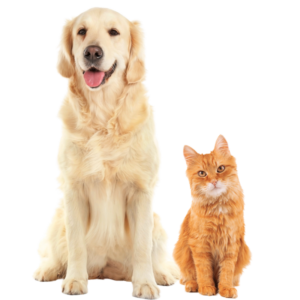My friends and family are always telling me my dog is fat, I think he is just very fluffy. He doesn’t eat very much so I don’t see how he could be overweight. How can I tell if my dog is too heavy?
Signed,
Confused and Concerned
Dear CC,
There are easy “tests” you can do at home to see if your pet is overweight. First, feel over your dog’s ribs, you should be able to easily feel the ribs with only a thin layer of fat covering them. If you have to press very hard to feel them he is likely carrying too much weight. Look at your dog from above; you should see a tucked waist or “hour-glass figure”. The same is true for his side view; you shouldn’t see fat hanging or be able to grab a handful of fat at his belly. There are breed standards for normal adult body weights, but this doesn’t help if your dog is smaller or larger than the average in his breed category. This is why each pet should be individually assessed.
If you’ve decided that your pet truly is overweight don’t feel alone, recent statistics show 50% of household cats and dogs are overweight and 35% are obese (weighing 30% more than ideal weight). This is a very concerning trend as obesity can lead to several health problems such as diabetes, arthritis, respiratory compromise, and most importantly will shorten your pet’s life span.
So identifying the problem is half the battle. What can you do to get your pet healthy again? Just like people too many calories in and not enough calories burned with exercise over time will cause obesity. You should look at what you are feeding your dog, your veterinarian can help. Many people make the mistake of thinking a cup of kibble can’t possibly be enough to satisfy their pet’s appetite, not taking into account how much smaller their pet is compared to a person and how calorie dense their pet’s food is. Also pets are smart they know begging behaviour will earn them a snack, there are not too many pets that will turn down a treat even if they are full! Your veterinarian can tell you how many calories your dog requires in a day to achieve weight loss; this must include any extra treats. Make an effort to increase your dogs activity level, this could include walking around the block or playing fetch, just make sure you do more than what you’re doing now. After 2-3 weeks weigh your pet, hopefully you will see some weight loss, if not don’t despair or give up ask your veterinarian to re-calculate calories required for the day as these numbers are based on the “average” dog and add an extra walk to your routine.
By achieving a lean body weight for your dog you will be giving yourself and your pet the gift of many extra, quality years together, which is priceless!
Best,
Dr. Kerr
For a free nutritional consult with the team at our Bolton veterinary hospital please call us at (905) 857-5057



